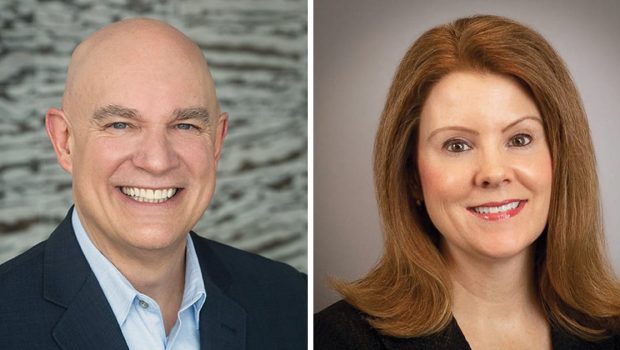CRAIN'S: Why did Astellas choose to adapt its Ways of Working and transition to a hybrid work environment?
MARK REISENAUER: As COVID-19 cases were on the rise, Astellas quickly adopted different working arrangements to ensure the health and safety of employees, while still allowing them to be fully functional in their roles. Recognizing that we needed to transition from merely accommodating flexibility (in response COVID-19 guidance) to developing a philosophy and strategic framework that supports long-term flexibility, we adjusted our Ways of Working philosophy to transition to a hybrid work environment. It's something we continually evaluate at Astellas as we work to deliver the best outcomes for our patients, customers, partners and other stakeholders, while also supporting the diverse needs of our employees.
CRAIN'S: How did you leverage lessons learned from the pandemic to create a Ways of Working philosophy that enables long-term flexibility for employees?
REISENAUER: Although we encouraged open and transparent two-way dialogue between leadership and employees before the pandemic, we knew the hybrid work environment required more than simply having an "open door" policy. We created new virtual channels for employees to share their needs and ideas, so that we could better support their well-being. For example, employees wanted to hear from our leaders directly more frequently and informally. So, we reimagined the large, formal, in-person town halls we used to have in the office and now host smaller, more frequent hybrid gatherings.
CRAIN'S: How does Astellas build connections and foster collaboration among employees in a hybrid environment?
REISENAUER: Building connections and collaboration can happen in many types of virtual and in-person environments. However, I'm particularly proud of the quarterly in-person events that we've been hosting at our Northbrook office. In our most recent event, we focused on giving back and partnered with two local charities to host events with hands-on activities. It was a great way for employees to volunteer together and build new relationships. We are also considering more frequent target days and times to bring our employees back to the office together.
CRAIN'S: Within the hybrid work environment, how much value do company leaders and employees place on opportunities for in-person/face-to-face interaction?
REISENAUER: Face-to-face, real-world interaction is incredibly important in creating moments for collaboration and innovation, while building relationships and strengthening company culture. Successful companies will find ways to balance the benefits of personal flexibility with the benefits of in-office interactions. While I can't speak for everyone, I know I'm especially energized when I'm in the office with colleagues as I appreciate the collaboration and ad-hoc conversations that are typically more challenging in a virtual setting. In the year ahead, I want to create more opportunities for employees to engage in-person and have meaningful moments together that strengthen relationships and connections across the organization.
CRAIN'S: How does your culture help to create a more diverse and inclusive company?
REISENAUER: Fostering a diverse and inclusive workplace and offering employees unique networking and learning opportunities remains a top priority. We empower our employees to establish inclusive support communities within the company and are proud to currently support seven dynamic employee impact groups (EIGs). Our EIGs enhance our ability to meet the needs of employees, patients and communities. Each EIG is led by a team of employee volunteers and an executive sponsor that focus on driving impact by aligning their objectives to four key pillars: career, culture, community and commerce. I was the executive sponsor for the Hispanic EIG, and in that time, we developed small group breakfast forums to facilitate networking and peer support. The ideas from our EIGs and effort to support the growth of our employees is incredible.
CRAIN'S: What challenges have you faced in your hybrid work environment and what solutions did you put in place to address them?
REISENAUER: One of the biggest challenges we face in our hybrid work environment is how to make and maintain meaningful connections. We have introduced several internal engagement campaigns for our employees to share their day-to-day activities in a casual environment in the same way they would by gathering at the water cooler or cafeteria. We also regularly survey our employees to understand how they view our culture and ways of working and where it can be improved. To this day, we continue to evolve and consider new ways that will be even more effective at bringing us together.
CRAIN'S: How do your employees feel about your Ways of Working philosophy?
REISENAUER: We're proud to consistently earn places on several top employer lists in a variety of areas, including LGBTQ equality, support for working parents, environmental sustainability, female empowerment, military support and more. Not only are these accomplishments a testament to the collaborative, innovative and inclusive culture that we foster, but they also show that our employees feel valued and empowered to do their best work. We continue to enjoy the benefits of working in a hybrid work environment, with a mix of time spent in the office and working remotely. As we moved through the difficult months of the pandemic, we also boosted our employee health and well-being programs and we've continued to improve our benefits based on new insights and feedback. Altogether, this helps us grow careers at Astellas and attract new, diverse talent.
CRAIN'S: How do you see hybrid work evolving in the next three to five years?
REISENAUER: First, I think it's important to recognize that not all companies and industries can offer a hybrid work environment, such as frontline healthcare workers, doctors and nurses who never stopped going into work and caring for their patients face-to-face every day. For companies like Astellas that can offer a variety of work options — virtual, hybrid, in-office — we must continue to listen to the needs of employees and evolve how and where we work accordingly. I believe hybrid work is here to stay, and we need to create adaptable organizational structures that blend virtual and in-office work opportunities and redefine company culture in new ways as the environment continues to transform.








Gloss